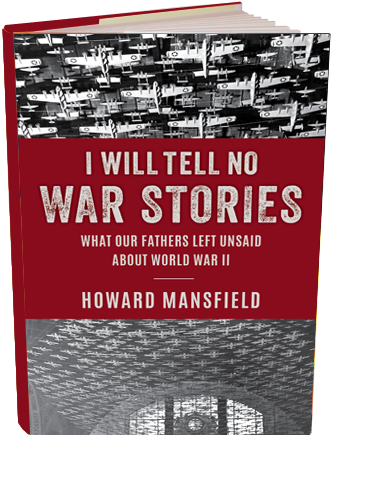I Will Tell No War Stories: What Our Fathers Left Unsaid About World War II
Lyons Press (April 2024)
ISBN: 978-1-4930-8108-0
Advance Praise for I Will Tell No War Stories
In this moving and absorbing book, Howard Mansfield tries to understand his father’s steadfast, lifelong refusal to discuss his service as a 19-year-old B-24 machine gunner during World War 2. There was guilt, of both the survivor and the killer, a deep sense of war’s depravity, but mostly there was the shadow of a terror so intense and sustained that not even a long life was enough to escape. To speak of it was to re-enter it. It was, as Mansfield’s research reveals, and as his father knew, an experience so overwhelming that words diminished it, as if trying to draw a frame around the infinite.
— Mark Bowden, author of Black Hawk Down: A Story of Modern War
World War II defined a generation. Howard Mansfield’s book I Will Tell No War Stories tells a moving personal and family story, and, in doing so, tells the story of that generation and of America itself. This is a wonderful book.
— Robert Rodat, screenwriter, Saving Private Ryan
Reviews
The compelling story of how the author’s father and the Air Force fought the Axis.
While journalist Mansfield’s father was alive, he never talked about his World War II experiences as a gunner in a B-24 bomber. The author instead found a notebook recording every mission in detail. Combining the notebook with other family documents and historical research, he delivers a gripping biography, emphasizing his father’s service while presenting a grim account of the bombing campaign.
During the war, serving in a bomber crew was more dangerous than being in the infantry. In 1943, only 25% completed their required 25 missions. Accuracy was also wildly exaggerated, with only 10-15% of bombs landing within 1,000 feet of their targets. This number increased by the end of the war, but as historian Donald L. Miller points out, “The German economy was bludgeoned to death by the blunt instrument of saturation bombing.”
Mansfield begins with the almost comic-operatic gunner training: No one discovered how to hit a tiny, fast-moving fighter moving in one direction from a vibrating, fast-moving bomber moving in another, although there was no shortage of ideas. Proceeding to accounts of men and missions produces a great deal of heroism and suffering along with some damage to their targets.
Perhaps most painful (and least publicized at the time) was the effect on fliers who might return to their huts after a mission to find the beds of their friends stripped. Fear that they were on a suicide mission was almost universal throughout the war, and the Air Force dealt with too many breakdowns and refusals to fly to treat them as simple cowardice—even though “the psychology of the era was a blunt tool.” Nonetheless, Mansfield’s father survived, so readers who expect a happy ending will not be disappointed.
A father’s war experiences, unvarnished and illuminating.
— Kirkus Reviews
“Mansfield … breaks through the wall of silence some war veterans maintain, using his father as a prime example. Despite Pincus Mansfield’s many harrowing WWII experiences as an air force gunner flying over Germany and occupied Europe, he kept his family in the dark about those grueling days. It wasn’t until his father’s death that Howard found his father’s war diary describing his bombing missions. The author set out to find as much information as he could about the Eighth Air Force in WWII and the dangers those bombers faced. The result is an impeccably researched and beautifully written account of the stories his father wouldn’t tell. Readers will find themselves in heated sheepskin flight suits and oxygen masks, high in the sky over enemy territory, and they will feel the frustration of a child asking his father what it was like and not getting any answers. A vital and moving history of all that is left unsaid in the aftermath of war and how that affects the next generation.”
— Booklist
“I don’t think I’ve read anything that conveys the brutality of war as powerfully as you do…. People may think this is just a terrific history book — which it is — but it’s also a cautionary tale for those of us who see sanitized pictures of a war. The universality of this book is totally there.”
— Jim Braude, co-host, Boston Public Radio, on GBH
“This was really a very moving book.”
— Margery Eagan, Boston Public Radio, on GBH
Listen to the interview here: BPR full show 4/26: Beep-Beep, Toot-Toot. At the 1:14 mark you’ll hear the lead-in music. (14 minutes)

